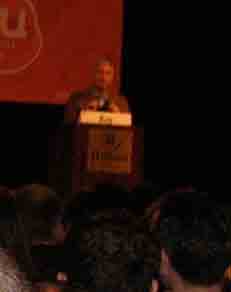SXSWedu 2012 got off to a running start today with its opening session, “On the Horizon: Harnessing Emerging Technologies in Education.” Symbolically, technology was used to provide three different educational conferences in different locations in Austin and Washington, D.C. with a video link so that keynote presenters at each of the conferences could speak to all three groups.
One was Larry Johnson who was present in D.C. at the Consortium for School Networking (COSN), another was Min Shonfeld of the Society for Information Technology and Teacher Education (SITE) meeting in Austin, and Ken Kay, CEO of Ed Leader21 and founding President of Partnership for 21st Century Skills, a group that advocates for technological readiness for each student in America was at SXSWedu, also in Austin.
Kay told the story of a friend, R.G., who developed colon cancer and sought treatment at a fine facility near Kay’s home in Arizona. He and his wife stayed with the Kays

when they came for treatments. Recently R.G. told Kay that his insurance was exhausted for the calendar year. Treatments until he was eligible for insurance again would cost $120,000. Kay and his wife looked at each other and thought, “That’s a death sentence.”
Two weeks ago R.G. showed up at their house and said that he’d raised about half the money needed already. He had begun a website, www.poopstrong.org, to raise the funds he’d need for those treatments not covered by insurance. Last night he said that he was close to raising just about all the money he needed.
Kay asked R.G. how he’d done it and was told that ten years ago he couldn’t have done it. The networks that helped him – his communities of interest that have supported him – like friends from the community where he got his undergraduate degree, other Bengali-Americans, and the community where he did his graduate studies – didn’t exist then. Nor did much of the technology.
R.G.’s creative website harnessed Paypal, the talents of a t-shirt designer and a button designer, and much more. Kay related the story to point out that thousands of people with a similar diagnosis and dilemma would not have the chance to do what R.G. had done – not so much because they lack access to the technology but because “they lack the personal thinking skills, the project management skills, they don’t have the cooperation skills. They can’t leverage the technology.”
The take-away includes the fact that 10 years ago the technology that was used to save R.G.’s life was not possible because it did not exist. The other?
“R.G.’s ability to create that site, and manage that site, and to succeed the site, is a very, unfortunately very rare set of skills that all of our students need to have to mine the potential of the network…”
“So the challenge I want to put forth to each of the three conferences is this: Let’s marvel at the technology, let’s realize how far we’ve come in 10 years, but if our kids don’t have the skills to leverage that technology – leverage it, not understand it, not design it – some people need to do that – but most of us will need to know how to use it as a platform. We are not doing that for most kids today.”
